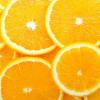Pasta, unlike OJ, contains considerable amounts of protein and is always eaten with a sauce containing olive oil or sometimes butter, another mostly saturated fat. This greatly reduces the glycemic index and load without increasing your fat calories by too much. As I pointed out previously, OJ has been separated from the fruit, which increases glycemic index. Though fruit contains large amounts of fructose, the polyphenols and fibers in fruit protect against the lipid raising effects, and some inhibit glycation.
Fructose, whether in corn syrup or in sucrose, goes not into energy, but to the liver which turns it into triglycerides that deposit as plaque in your arteries. Bad news for your lipid levels. Stick to a few pieces of fruit a day, hold the juice. Hydration energy drinks are engineered, and the best of them are no more than 10% calories frm fructose, and 94% water. ( A banana and some water are remarkably successful at filling this function.)
Higher blood sugar levels induce protein glycation (as may MUFA's ) some polyphenols may be protective, therefore fruit, and lower peak levels. Humans have AGE receptors, and we have probably evolved to deal with a certain amount, put peak glucose spikes from sugar likely overwhelm these defences.
"Don't want no sugar in my coffee. Makes me mean, oh Lord, it makes me mean."
Traditional work song
Generally Pasta has about 20% protein/carb ratio and OJ has about 8% protein/carb.
Plant protein isn't all that great generally, and you are going to need some animal protein anyway.
Besides, OJ will have whatever polyphenols that Oranges have.
Additionally gluten resists digestion and is hard to absorb generally. So don't count on that protein from pasta.
Again, the link between sugars and glycation isn't that strong. In addition, fiber mostly protects against lipid raising by reducing absorption of fats, a problem which wouldn't be there if you weren't consuming fats (PUFA) to begin with. Additionally, lowered cholesterol is itself associated with an increased risk of death, so you want to be careful of that.
Bananas aren't that great, they have too much fiber and too little sugar (it's hard to get ripe bananas). They will mostly feed your gut bacteria and not feed you enough.
As for AGE receptors, ALEs trigger them too. Even antibodies ...
Immunochemical crossreactivity of antibodies specific for "advanced glycation endproducts" with "advanced lipoxidation endproducts".I bet the sugar crash can be mean if you were doing physical labour, and no way they would get enough sugar to keep them going, just enough for a quick pick-me-up and then a crash.
Orange juice or fructose intake does not induce oxidative and inflammatory response.
Abstract
OBJECTIVE:
We have previously shown that 300 kcal from glucose intake induces a significant increase in reactive oxygen species (ROS) generation and nuclear factor-kappaB (NF-kappaB) binding in the circulating mononuclear cells in healthy normal subjects. We hypothesized that the intake of 300 calories as orange juice or fructose, the other major carbohydrate in orange juice, would induce a significantly smaller response than that of glucose.
RESEARCH DESIGN AND METHODS:
Four groups (eight subjects each) of normal-weight subjects were given a 300-cal drink of glucose (75 g), fructose (75 g), or orange juice or water sweetened with saccharin (control group) to drink, and then blood samples were collected.
RESULTS:
There was a significant increase in ROS generation by mononuclear cells (by 130 +/- 18%, P < 0.001), polymorph nuclear cells (by 95 +/- 22%, P < 0.01), and in NF-kappaB binding in mononuclear cells by 82 +/- 16% (P < 0.01) over the baseline after 2 h of glucose intake. These changes were absent following fructose, orange juice, or water intake. There was significantly lower ROS generation and NF-kappaB binding following orange juice, fructose, and water compared with glucose (P < 0.001 for all). Furthermore, incubation of mononuclear cells in vitro with 50 mmol/l of the flavonoids hesperetin or naringenin reduced ROS generation by 52 +/- 7% and 77 +/- 8% (P < 0.01), respectively, while fructose or ascorbic acid did not cause any change.
CONCLUSIONS:
Caloric intake in the form of orange juice or fructose does not induce either oxidative or inflammatory stress, possibly due to its flavonoids content and might, therefore, represent a potentially safe energy source.
Nutrition. 2005 Feb;21(2):240-8.
Changes in lipid metabolism and antioxidant defense status in spontaneously hypertensive rats and Wistar rats fed a diet enriched with fructose and saturated fatty acids.
Girard A, Madani S, El Boustani ES, Belleville J, Prost J.
OBJECTIVE:
Larger doses of fructose and saturated fat have been associated with oxidative stress and development of hypertension. The effects of modest amounts of fructose and saturated fatty acids on oxidative stress are unknown.
METHODS:
To increase knowledge on this question, 10-wk-old spontaneously hypertensive rats and Wistar rats were fed for 8 wk with a control diet or an experimental diet enriched with fructose (18%) and saturated fatty acids (11%; FS diet). The total antioxidant status of organs and red blood cells was assayed by monitoring the rate of free radical-induced red blood cell hemolysis. Sensitivity of very low-density lipoprotein and low-density lipoprotein (VLDL-LDL) to copper-induced lipid peroxidation was determined as the production of thiobarbituric acid-reactive substances. Antioxidant enzymes and vitamins were also measured to establish the oxidative stress effect.
RESULTS:
The FS diet did not affect blood pressure in either strain, but it increased plasma insulin concentrations only in Wistar rats without affecting those of glucose of either strain. The FS diet significantly enhanced plasma and VLDL-LDL triacylglycerol concentrations without affecting concentrations of VLDL-LDL thiobarbituric acid-reactive substances. The decreased content of arachidonic acid and total polyunsaturated fatty acids in VLDL-LDL by the FS diet may have prevented lipid peroxidation in this fraction. Moreover, FS consumption by both strains was accompanied by a significant increase in total antioxidant capacity of adipose tissue, muscle, heart, and liver. This may have resulted from increased tissue ascorbic acid levels and glutathione peroxidase and glutathione reductase activities in tissues.
CONCLUSIONS:
These findings clearly indicate that the FS diet did not alter blood pressure of spontaneously hypertensive rats and Wistar rats. The FS diet resulted in hypertriglyceridemia but increased the total antioxidant status, which may prevent lipid peroxidation in these rats.
In 1963 and 1964, experiments (Carroll, 1964) showed that the effects of glucose and fructose were radically affected by the type of fat in the diet. Although 0.6% of calories as
polyunsaturated fat prevents the appearance of the Mead acid (which is considered to indicate a deficiency of essential fats) the “high fructose” diets consistently add 10% or more corn oil or other highly unsaturated fat to the diet. These large quantities of PUFA aren’t necessary to prevent a deficiency, but they are needed to obscure the beneficial effects of fructose. -Ray Peat, PhD




















































